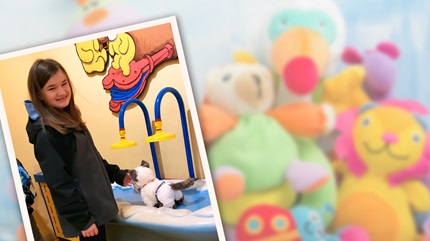Overview
The Center for Pediatric Rheumatology at Cleveland Clinic Children’s is dedicated to providing cutting-edge, patient-centered care to children with a broad range of rheumatologic conditions. Our center is recognized for excellence in the diagnosis and management of a variety of inflammatory and autoimmune disorders that affect the joints, muscles, skin, blood vessels, brain, and other vital organs. Our physicians, surgeons and scientists are known nationally and internationally for their leadership, innovation and superior patient care outcomes.
What We Treat
Rheumatic and autoimmune diseases are disorders which can affect any part of the body including the joints, muscles, connective tissues, and soft tissues around the joints and bones.
Our Pediatric Rheumatology team at Cleveland Clinic Children’s provides diagnosis, education and comprehensive care for children both in the United States and around the world, with a wide range of conditions including:
Primary inflammatory joint disorders
- Juvenile idiopathic arthritis.
- Ankylosing spondylitis.
- Psoriatic arthritis.
- Arthritis associated with inflammatory bowel disease.
- Post-infectious reactive arthropathy.
- Reactive arthritis.
Systemic autoimmune disorders
- Systemic lupus erythematosus (SLE).
- Dermatomyositis and polymyositis.
- Systemic sclerosis.
- Mixed connective tissue disease.
- Sjogren’s syndrome.
- Antiphospholipid syndrome.
- Sarcoidosis.
- Behcet’s disease.
- Relapsing polychondritis.
- Macrophage activation syndrome (MAS).
Vasculitis disorders
- Henoch-Schonlein purpura (HSP).
- Kawasaki disease.
- Takayasu’s arteritis.
- Granulomatosis with polyangiitis (formerly known as Wegner’s granulomatosis).
- Microscopic polyangiitis.
- Eosinophilic granulomatosis with polyangiitis (formerly known as Churg-Strauss vasculitis).
- Polyarteritis nodosa.
- CNS vasculitis.
Periodic fever / autoinflammatory syndromes
- Periodic Fever Aphthous Stomatitis and Adenitis Syndrome (PFAPA).
- Familial Mediterranean Fever Syndrome (FMF).
- Tumor necrosis factor (TNF)-receptor associated periodic fever syndrome (TRAPS).
- Mevalonate kinase deficiency (aka Hyper IgD syndrome).
- Cryopyrin associated periodic fever syndrome (CAPS).
- Familial Cold Autoinflammatory syndrome (FCAS).
- Muckle-Wells syndrome.
- Neonatal-onset multisystem inflammatory disease (NOMID) or Chronic Inflammatory Neonatal Arthritis (CINCA).
- Chronic recurrent multifocal osteomyelitis (CRMO).
- Chronic recurrent osteomyelitis.
- Deficiency of adenosine deaminase 2 (DADA2).
- Pyogenic arthritis, pyoderma gangrenosum, and acne syndrome (PAPA).
- Synovitis, acne, pustulosis, hyperostosis, osteitis (SAPHO).
- Deficiency of the interleukin-1 receptor antagonist (DIRA).
- Blau’s syndrome.
- Majeed’s syndrome.
In collaboration with other Cleveland Clinic specialties
- Ophthalmology: iritis, iridocyclitis, uveitis, retinal vasculitis.
- Dermatology: morphea, localized scleroderma, En coup de sabre, cutaneous vasculitis, linear scleroderma, eosinophilic fasciitis, erythema nodosum, panniculitis, urticarial vasculitis.
- Neurology: autoimmune encephalitis, cerebritis.
- Epilepsy: refractory epilepsy requiring immune modulation treatment.
- Gastrointestinal : inflammatory bowel disease (Crohn’s disease and ulcerative colitis).
- Nephrology: nephritis, nephritic proteinuria associated with systemic autoimmune disease.
- Vascular medicine: Raynaud’s syndrome (primary and secondary).
- Genetics: monogenetic autoimmune and autoinflammatory syndromes.
- Hematology: autoimmune cytopenia, autoimmune lymphoproliferative syndrome (ALPS).
- Endocrinology: autoimmune polyendocrinopathy (APECED).
What to Expect
Working closely with our colleagues in adult orthopaedic and rheumatology programs, we can also provide seamless transition of care for young adults with childhood-onset rheumatic conditions.
We are a regional, national, and international referral center for families seeking initial evaluation or second opinion services for pediatric rheumatologic conditions, including juvenile arthritis, vasculitis and childhood autoinflammatory diseases.
Our facility may offer patients the opportunity to participate in state-of-the-art clinical trials for juvenile arthritis and vasculitis.
The members of the Center are dedicated to working closely with patients and coordinating efforts with referring providers to ensure families receive world-class care close to home.
Multidisciplinary team
Through our multidisciplinary approach and the expertise of our pediatric team members, Cleveland Clinic is able to offer high quality care in a number of specialty areas. Our team of expert doctors coordinates their efforts with a variety of pediatric subspecialist colleagues to provide world-class, comprehensive care to patients and families. The Pediatric Rheumatology team has close collaboration with the following subspecialists at Cleveland Clinic Children’s:
Programs
The Center for Pediatric Rheumatology has established comprehensive programs for the diagnosis and treatment of children and adolescents who are living with a variety of rheumatologic disorders. Learn more about each of these programs and the patients they serve.
Childhood Autoinflammatory Diseases
Auto-inflammatory diseases are typically characterized by recurrent episodes of fever, rash, lymphadenopathy, and musculoskeletal involvement. Symptoms may include abdominal pain. These are common symptoms encountered by a general pediatrician, yet their recurrent and recognizable pattern of presentation may allow for further specialized work-up, diagnosis, and management. The autoinflammatory diseases represent a group of rapidly expanding conditions, many of which have a testable genetic etiology.
Cleveland Clinic Children’s has developed a comprehensive care center specializing in both the evaluation and treatment of patients with recurrent fevers. Our center serves both previously diagnosed and undiagnosed patients with suspected autoinflammatory diseases.
Juvenile Idiopathic Arthritis (JIA)
Juvenile idiopathic arthritis (JIA) is an autoimmune condition that causes arthritis (joint inflammation) in children. It can occur at any age starting from toddler to adolescent, and involve any joint. Common symptoms include joint pain, joint swelling, feeling of joint stiffness mostly in the morning and limitation of joint motion/function. If left untreated, JIA can lead to joint contracture, bone damage and deformity.
In our Pediatric Rheumatology Center at Cleveland Clinic Children’s, all of our pediatric rheumatologists, nurses and team have a unified mission to provide the best possible care, as well as education, to our patients and families. We may utilize a state-of-the-art ultrasound in our clinic, performed at the bedside, to facilitate early detection of arthritis and follow treatment response. We also participate in Childhood Arthritis and Rheumatology Research Alliance (CARRA) Registry for children with JIA to broaden knowledge of this disease. Due to risk of uveitis and musculoskeletal sequel from arthritis, we closely collaborate with our colleagues in ophthalmology, rehabilitation, orthopedics and any subspecialties that patients need.
Pediatric Vasculitis
Vasculitis diseases of childhood vary in symptoms presentation, vessel involvement, and severity. Making an accurate diagnosis of childhood vasculitis can be challenging. In collaboration with The Cleveland Clinic Center for Vasculitis Care and Research, our pediatric team has the necessary expertise and resources to accurately diagnose your child and provide expert recommendations for treatment and ongoing care. Our center serves both previously diagnosed patients for second opinion, as well as yet to be diagnosed patients with suspected vascular and vasculitis diseases.
Systemic Lupus Erythematous (SLE) and associated diseases
Children with systemic lupus erythematous (SLE) can present with multiple symptoms including, but not limited to, fatigue, fever, malar rash, body rash, oral ulcers, or joint pain. It can affect vital organs causing inflammation in the lungs, heart, GI tract and, most commonly, kidneys. Each SLE patient does not present with the exact same symptoms, and may be difficult to diagnose. SLE in children may be more severe compared to adult. Early detection is imperative to achieve better therapeutic outcome. Our pediatric rheumatologists have strong experience in providing evaluation, diagnosis and treatment for children with SLE including its associated diseases, such as Sjogren’s disease, mixed connective tissue disease, overlap type rheumatologic disease, and scleroderma. Our team values the power of education, understanding, and compliance as key factors for success in the care of SLE patients. Our team works closely with nephrologists, pulmonologists, dermatologists, neurologists and any subspecialties that patients may need. We also participate in Childhood Arthritis and Rheumatology Research Alliance (CARRA) Registry for children with SLE disease.
Juvenile Dermatomyositis
Juvenile dermatomyositis is an autoimmune condition which causes rash and weakness in children. Common symptoms can include a reddish-purple rash over the eyelids or knuckles, redness over the face, fatigue, trouble climbing stairs or onto the bus, difficulty reaching up to shampoo or comb hair, trouble swallowing, or hoarse voice. Our group is experienced in treating children with juvenile dermatomyositis. We also belong to the International Myositis Assessment and Clinical Studies Group (IMACS) and participate in research to find better treatments for juvenile dermatomyositis. We also participate in the Childhood Arthritis and Rheumatology Research Alliance (CARRA) Registry for children with juvenile dermatomyositis and polymyositis. We collaborate with pediatric neurologists and dermatologists, as well as physical and occupational therapists to better care for patients with juvenile dermatomyositis.
Transition Clinic for Pediatric Rheumatology
Adolescent and young patients with chronic medical conditions need an environment in which to grow, develop and learn to take ownership of management of their medical care prior to transitioning to an adult provider. This is best done starting at a younger age so that when patients become adults, they are able to take over this role. Rheumatology is an area in medicine in which patients are frequently diagnosed with conditions that require lifelong care in order to maintain function and limit disability.
The need to establish an environment in which this transition can be successfully accomplished requires creation of facilities that are designed to maximize the supportive care given in the pediatric setting while allowing and empowering patients to play a greater role in their own care.
Our transition clinic in pediatric rheumatology promotes an environment in which adolescents and young adults have access to social work, psychologists, nurses and physicians working to help them make the necessary transition to an environment that allows them to become increasingly more involved in the management of their healthcare needs as they develop and mature.
Genetic Autoimmune Disease
Patients may present with complicated, atypical autoimmune disease involving multiple organ systems. This may be a sign of having a genetically based autoimmune disease, and many monogenetic (single gene) causes of autoimmune diseases have been discovered in recent years. In rheumatology we collaborate with specialists in genetics, immune deficiency, and hematology at Cleveland Clinic Children’s to optimize the evaluation and provide evidence based, therapeutic recommendations for your child.
Pediatric Rheumatology Research
The Center for Pediatric Rheumatology participates in an investigator-led collaborative research network of North American pediatric rheumatologists named the Childhood Arthritis and Rheumatology Research Alliance (CARRA). Through CARRA, we participate in a registry of childhood-onset rheumatic diseases including juvenile idiopathic arthritis, juvenile dermatomyositis, and childhood-onset systemic lupus erythematosus, which in the future will give us information on long term safety of medications, how effectively they work, and patient outcomes. This currently gives us the opportunity to participate in treatment trials so that we can offer innovative new treatments to our patients. We participate in medication trials through the Pediatric Rheumatology Collaborative Study Group (PRCSG). We have study coordinators and nurses who help us in our mission to find the best treatments for our young patients with rheumatic disease.
Our Doctors
Looking for a pediatric rheumatologist?
Find a ProviderAppointments & Locations
Appointments
To make an appointment with the Center for Pediatric Rheumatology, please call 216.444.5437 or 800.223.2273, ext. 45437 (toll-free).
Pediatric Infusion Clinics
At Cleveland Clinic Children’s, we want to make leading edge treatment as convenient as possible for you and your child. As a way to maximize convenience and minimize family stress, we offer private infusion rooms for children and teens with Crohn’s disease, juvenile arthritis, lupus, uveitis, dermatomyositis, allergies, endocrine conditions, hematological disorders, neurological disorders, pediatric cancer, and those who have undergone blood or marrow transplantation.
Locations
International Access
The Center for Pediatric Rheumatology is internationally recognized for its expertise in evaluation of rare or complex rheumatologic conditions. In addition to providing pediatric patients with quality family-centered care we also offer rheumatology care for children and adolescents outside of the country.
Through the Global Patient Services Department, our International Center regularly arranges visas, travel, and accommodations for families who require extensive out-patient evaluations and/or in-patient management. Translators are also available for 28 languages for the convenience of all of our patients. The International Center may be reached at +1.216.444.6404.
Long distance consultations are also available through Virtual Second Opinions. Our physicians are able to review case histories from other states or overseas at the request of patients or individual physician generalists and specialists.
Virtual Second Opinions
If you cannot travel to Cleveland Clinic, help is available. You can connect with Cleveland Clinic specialists from any location in the world via a phone, tablet, or computer, eliminating the burden of travel time and other obstacles.
If you’re facing a significant medical condition or treatment such as surgery, this program provides virtual access to a Cleveland Clinic physician who will review the diagnosis and treatment plan. Following a comprehensive evaluation of medical records and labs, you’ll receive an educational second opinion from an expert in their medical condition covering diagnosis, treatment options or alternatives as well as recommendations regarding future therapeutic considerations. You’ll also have the unique opportunity to speak with the physician expert directly to address questions or concerns.




